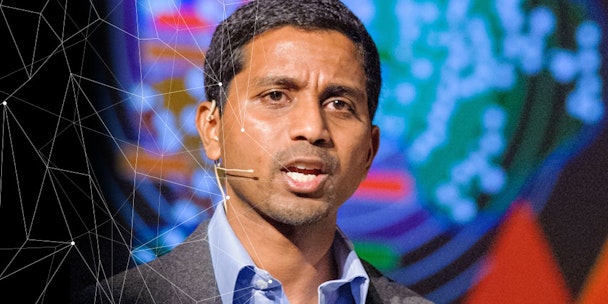A picture of wealth: Nigel Vaz on Globalisation 4.0
Publicis Sapient’s recently promoted global chief executive Nigel Vaz was our man in Davos this year, reporting back from the World Economic Forum where world leaders debated how to define a new, more inclusive, approach to globalization. Welcome to Globalization 4.0.

Nigel Vaz is chief executive at Publicis Sapient
Globalization is a term that means different things to different people, but for those I met in the halls of Davos this year at the World Economic Forum (WEF) annual meeting, globalization is a phenomenon that increases opportunity and wealth for all.
While there is some disquiet about the media spectacle and commercialized event that the Davos meeting has become, the impression I get of WEF and its founder Professor Klaus Schwab is an unswerving belief that WEF is genuinely “committed to improving the state of the world by engaging business, political, academic and other leaders of society to shape global, regional and industry agendas”. Its facilitation of the exchange of knowledge, trade and capital throughout the world is based on this stated purpose.
For many in today’s febrile political climate, however, globalization has increasingly become a punching bag – viewed as an inequitable force responsible for job losses underpinned by seismic economic changes in the west. The shift from human-intensive production to machine-intensive has, for instance, disrupted long-standing employment opportunities in towns and communities across the developed world.
At Davos this year, advocates of globalization across business and politics started to take note. The theme of the conference, Globalization 4.0, took on board concerns raised by recent populist backlashes and synthesized them with the view that globalization is a positive force driving economic prosperity. In short, Globalization 4.0 moved the debate on globalization away from viewing the phenomenon purely through the prism of economics to one that embraces the interconnectedness of issues such as inequality, access to AI, responsible government, corporate governance and the environment.
For many business leaders, however, the real paradox arrives when we begin to interrogate the contradictory and equally powerful movements toward both hyperlocalism and hyperglobalism. We have populist political movements throughout Europe, the US and across the entire world gaining traction for their outwardly stated anti-globalist positions. At the same time, technology and the way people use it is increasingly uniform: as an interface to the rest of the world.
While production, services, manufacturing and global supply chains have become increasingly global – along with the tech infrastructure that supports this – our narratives of self-identity can operate on a national or even sub-national level. Our ideologies are increasingly inward-looking, but the ways we communicate with each other are no longer limited to local postal systems and face-to-face encounters; rather they flow freely across a global digital ecosystem.
Advocates of globalization across business and politics need to consider and address these seemingly antithetical forces and behaviors. Even though people increasingly use the same technology worldwide, organizations need to understand that people aren’t homogeneous groups. We are not even homogeneous in the same country or city, as the Brexit referendum of 2016 painfully illustrated. Rather, we witnessed that people can opt for the same thing for different reasons, and despite coming from seemingly opposite cultural and socioeconomic backgrounds.
In this context, organizations are now better placed to identify and operate according to the reality of how people behave, as opposed to responding to preconceived notions of how we think they behave. In a similar vein, we can distinguish between an individual’s curated self-identity and their actual behavior. As an example, Netflix eschews the ratings that viewers proactively give to various programming they watch (or claim to watch, in order to impress) in favor of actual viewing data. As a system, it still requires discernment: knowing that an individual’s device is playing an entire box set does not guarantee that they haven’t just fallen asleep in front of it, for instance. It does, however, get us closer to the point where technology identifies local, single user-level information, but at global scale.
The real issue here, for technology giants in particular, is that understanding people on a hyperlocal level and serving them in a hyper-personalized way requires a deep level of personal information, permission for which is not often freely given. Conversely, a hyperglobal understanding is based on large-scale inferred behaviors; the collection of such data through global digital platforms is possible but, as we know, is not something consumers, communities and governments are comfortable with.
Social platforms such as Facebook, Instagram and Twitter are being used across national boundaries and are on a journey to understand their role and responsibilities in an interconnected world. Sheryl Sandberg said to those gathered at Davos that Facebook “did not anticipate all the risks from connecting so many people”, and acknowledged the need to earn back trust from consumers.
While globalization is a tricky and contentious term for many across the world, the opening up of the debate around it to include the concerns of populists – and the paradoxes surrounding technology – can help to ensure globalism is a term understood both for what it brings, as well as the risks inherent in an interconnected world.
Nigel Vaz is chief executive at Publicis Sapient
